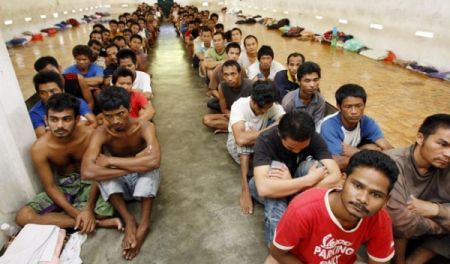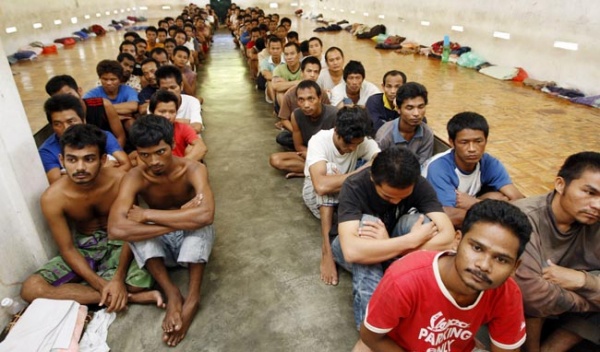Tommy Thomas examines the Australian High Court decision in the refugee swap case, and wonders how Malaysian courts would have dealt with the issue.
A. The Australian Proceedings
The recent decision of the highest court in Australia, its High Court, which received tremendous worldwide publicity, substantially damaged Malaysia’s international standing, particularly in the way it treats refugees and asylum-seekers. Malaysia’s refusal to ratify the 1951 Geneva Convention on Refugees (“the Refugee Convention”) cost us dearly in the litigation. It is therefore critical that Malaysia immediately adopts the Refugee Convention so that it meets standards acceptable under public international law. Further, Malaysia must urgently enact laws to protect refugees and asylum-seekers, and give them proper status in our domestic law. This article considers the Australian decision, and how a similar case would have been treated by our Courts under our laws.
In Plaintiff M70/2011 and Plaintiff M106/2011 v. Minister for Immigration and the Commonwealth of Australia, the High Court of Austalia, by a 6-1 majority, declared that Malaysia could not qualify as a “specified country” within the meaning of Section 198A of the Migration Act, 1958 of Australia (“the Migration Act”) for the purposes of receiving refugees, and granted an injunction restraining the Defendants from taking the Plaintiffs to Malaysia. The Plaintiffs are citizens of Afghanistan, and arrived by boat at the Australian territory of Christmas Island on 4th August 2011. They had travelled through Pakistan, Dubai, Thailand, Malaysia and Indonesia. Both Plaintiffs are Shia Muslims. Both claim to have a well-founded fear of persecution in Afghanistan on grounds that would, if established, make them “refugees” to whom Australia owes protection obligations under the Refugees Convention. Lacking visas, both are “unlawful non-citizens” and “offshore entry persons” with the meaning of the Migration Act. Both were detained upon arrival at Christmas Island.
Both Plaintiffs are subject to a new administrative regime, established by the Australian Government, for the transfer to Malaysia of up to 800 asylum seekers irregularly arriving in Australia by sea after 25th July 2011. The regime was set up pursuant to an Arrangement between the governments of Australia and Malaysia entered into on 25th July 2011 (“the Arrangement”). On 7th August 2011, an officer of the Department of Immigration determined that Plaintiff M70 was liable for removal from Australia, and should be taken to Malaysia under the Arrangement. In respect of Plaintiff M106, the only impediment to his removal was the establishment in Malaysia of relevant support services for unaccompanied minors (he being 16 years old). Neither Plaintiff wished to go to Malaysia voluntarily.
The critical provision in the Migration Act Section 198A, the material parts of which read:
“Migration Act, 1958 Section 198A
“(1) An officer may take an offshore entry person from Australia to a country in respect of which a declaration is in force under subsection (3);
(3) The Minister may:
(a) declare in writing that a specified country:
(i) provides access, for persons seeking asylum, to effective procedures for assessing their need for protection; and
(ii) provides protection for persons seeking asylum, pending determination of their refugee status; and
(iii) provides protection to persons who are given refugee status, pending their voluntary repatriation to their country of origin or resettlement in another country, and
(iv) meets relevant human rights standards in providing that protection;”
At the same time as the Arrangement was entered into between the two countries, that is, on 25th July 2011, a declaration of Malaysia as a “specified country” was made by the Minister of Immigration purportedly acting under Section 198A (3).
The Plaintiffs commenced these proceedings on 7th August 2011. On 8th August 2011, a single judge of the High Court (Justice Hayne) made an interlocutory order restraining the Minister from removing the Plaintiffs from Australia pending the disposal by a full court of their case. The case was heard by the full bench of the High Court on 17th August. Judgment was delivered on 31st August 2011. The grounds running to 96 pages are posted at AUSTLII.

Among the materials considered by the Minister before he declared that in his judgment Malaysia satisfied the four criteria under Section 193A(3) was an assessment provided by the Australian Department of Foreign Affairs and Trade (“DFAT”). The DFAT Assessment made the following nine salient points:
- Malaysia is not a party to the Refugee Convention and does not itself grant refugee status or asylum or have in place legal protections for persons seeking asylum.
- Malaysian authorities nevertheless “generally cooperate with the United Nations High Commissioner for Refugees (“ the UNHCR”).
- There are, according to the UNHCR, “credible indications that forcible deportations of asylum seekers and refugees had ceased in mid-2009.”
- A number of “fundamental liberties” are contained in the Malaysian Federal Constitution and the Malaysian Human Rights Commission is active in fulfilling its mandate with respect to those rights, including inquiries about complaints.
- Illegal immigrants in Malaysia are liable to imprisonment and/or a fine and caning of not more than six strokes.
- Access to health care is provided to refugees with cards issued by the UNHCR at a discounted rate available to foreigners. However, the costs are generally beyond the means of refugees.
- Lack of official status has impeded access by refugees to sustainable livelihoods or formal education.
- Credible allegations have been made regarding inadequate standards in immigration detention centers.
- Malaysia is not a party to the International Covenant on Civil and Political Rights or the International Covenant on Economic, Social and Cultural Rights. It is a party to the Convention on the Elimination of All Forms of Discrimination Against Women, the Convention on the Rights of Persons with Disabilities and the Convention on the Rights of the Child.
In these circumstances, it comes as a surprise that the Australian Minister took the position that the conditions enumerated in Section 198A (3) were satisfied. The High Court took a contrary view. A review of the majority judgments will indicate that the High Court decided that Malaysia cannot be a “specified country” within the meaning of Section 198A of the Migration Act, 1958 for the following three principal reasons:
- Malaysia does not recognize the status of refugees under its domestic law. The Immigration Act, 1959 of Malaysia does not afford any protection to refugees and asylum-seekers;
- the Plaintiffs are not protected from prosecution in Malaysia for their prior illegal entry into and exit from Malaysia; and
- Malaysia is not a safe third country to provide protection, under the law, to refugees and asylum-seekers.
The concluding paragraphs of the judgment of Chief Justice French are instructive:-
“The criteria for a declaration set out in s 198A(3)(a) are not limited to those things necessary to characterise the declared country as a safe third country. They are statutory criteria, albeit informed by the core obligation of non-refoulement which is a key protection assumed by Australia under the Refugee Convention. Attention must be directed to the statutory language. The questions the Minister must ask himself, about whether the relevant ‘access’ and ‘protection’ are provided and “human rights standards” are met, are questions which cannot be answered without reference to the domestic laws of the specified country, including its Constitution and statute laws, and the international legal obligations to which it has bound itself. The use of the terms “provides access … to effective procedures”, “protection” and “relevant human rights standards” are all indicative of enduring legal frameworks. Having regard to the Minister’s concession and what appears, in any event, from the submissions upon which the Minister acted and his affidavit, it is clear that he did not look to, and did not find, any basis for his declaration in Malaysia’s international obligations or relevant domestic laws. There is no indication that the apparent legal fragility of the exemption order under the Malaysian Immigration Act and the associated risks to transferees were drawn to his attention. Important elements of his decision were the non-binding Arrangement, conversations he had undertaken with his ministerial counterpart in Malaysia, and observations by DFAT about contemporary practices with respect to asylum seekers in that country.
An affirmative answer to the questions posed by the criteria in s 198A(3)(a), reached by reference only to the specified country’s laws and international obligations, is not the end of the necessary ministerial inquiry. Constitutional guarantees, protective domestic laws and international obligations are not always reflected in the practice of states. There are examples around the world of governments whose implementation of human rights standards fall short of the authoritative legal texts, be they constitutional or statutory, or embedded in treaties and conventions which, on the face of it, bind them. The existence of a relevant legal framework which on paper would answer the criteria in s 198A(3) cannot therefore always be taken as a sufficient condition for the making of a declaration. The Minister must ask himself the questions required by the criteria on the assumption that the terms “provide” and “meet” require consideration of the extent to which the specified country adheres to those of its international obligations, constitutional guarantees and domestic statutes which are relevant to the criteria.
Conclusion
The ministerial declaration of 25 July 2011 was affected by jurisdictional error. It was not a declaration authorised by s 198A of the Migration Act. The plaintiffs cannot therefore be taken to Malaysia pursuant to the power conferred”
(my emphasis)
Likewise, this paragraph from the Joint Judgment of Justices Gummow, Hayne, Heydon, Crennan and Bell:-
“As already explained, the references in s 198A(3)(a) to a country that provides access and provides protection are to be construed as references to provision of access or protection in accordance with an obligation to do so. Where, as in the present case, it is agreed that Malaysia: first, does not recognise the status of refugee in its domestic law and does not undertake any activities related to the reception, registration, documentation and status determination of asylum seekers and refugees; second, is not party to the Refugees Convention or the Refugees Protocol; and, third, has made no legally binding arrangement with Australia obliging it to accord the protections required by those instruments; it was not open to the Minister to conclude that Malaysia provides the access or protections referred to in s 198A(3)(a)(i) to (iii).…………………………………………………………..The Jurisdictional facts necessary to making a valid declaration under s 198A(3)(a) were not and could not be established.
The Minister’s declaration was made beyond power. “(my emphasis)
Numerous other passages in the majority judgments are also not flattering to Malaysia. There is no doubt that the lack of any recognition or protection under the laws of Malaysia to refugees and asylum-seekers was the fundamental cause for the Australian High Court’s decision. The image of Malaysia as a decent, law abiding member of the world community and of the Commonwealth has received a massive battering by reason of this decision. Our image must be immediately repaired, and that can only occur if concrete legislative and executive measures are quickly taken. Anyway this is the right thing to do.
What would the outcome be, if parallel proceedings were to take place in Malaysia? The second installment will be published tomorrow.


Appreciative concerning not giving any advancement. I'll be chasing around additional down more rule.
Desperate Aussie female PM to salvage the immoral deal will fail. The law makers of Australia could see through the barbaric behavior of the SOB BN govt dish out to the pitiful defenseless refugees. Gillard, your rule is terminal…